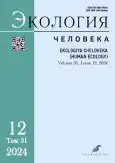Regional features of the dynamics of overall morbidity due to mental disorders among employees of the internal affairs bodies of the Russian Federation in Moscow
- Authors: Ichitovkina E.G.1,2, Solovyev A.G.2, Zhernov S.V.3, Shugusheva Z.A.4
-
Affiliations:
- Central Polyclinic No. 2, Moscow
- Northern State Medical University
- Derzhavin Tambov State University
- Polyclinic No. 1, Moscow
- Issue: Vol 31, No 12 (2024)
- Pages: 878-892
- Section: ORIGINAL STUDY ARTICLES
- URL: https://journal-vniispk.ru/1728-0869/article/view/314562
- DOI: https://doi.org/10.17816/humeco643546
- EDN: https://elibrary.ru/vrzdrn
- ID: 314562
Cite item
Full Text
Abstract
BACKGROUND: Preserving mental health and extending the professional longevity of law enforcement personnel in the Russian Federation are among the primary goals of the departmental healthcare system. A comprehensive analysis of not only primary but also overall morbidity is relevant for improving preventive and therapeutic interventions. Considering the influence of extreme factors and the specifics of official duties, an analysis of trends over time of mental disorder morbidity should take into account regional characteristics.
AIM: The work aimed to analyze the trends in the overall morbidity of mental disorders among law enforcement personnel of Russian Federation, as exemplified by the city of Moscow.
METHODS: The study is based on official reporting data from medical institutions of the Ministry of Internal Affairs of the Russian Federation in Moscow over a 16-year period. Indicators of overall morbidity due to mental disorders and work incapacity were analyzed in employees with official ranks. Calculations were performed per 1,000 personnel (‰). The main categories of ICD-10 Chapter V were assessed. Additionally, indicators of temporal change such as absolute growth, growth and increase rates, base index, and correlation coefficients between overall mental disorder morbidity and work incapacity were evaluated.
RESULTS: From 2008 to 2022, a general upward trend in overall morbidity due to mental disorders was observed, mainly due to an increase in cases of neurotic, stress-related, and somatoform disorders. At the same time, morbidity rates for behavioral disorders associated with physiological disturbances and physical factors, as well as personality and behavioral disorders in adults, remained consistently low and did not exceed 0.33‰. The overall morbidity rate for mental disorders ranged from 7.00 to 11.24‰. Simultaneously, a steady decrease in the number of cases and days of temporary work incapacity was recorded, along with stabilization in the average duration of a single incapacity case. A strong positive correlation was found (r = 0.91) between mental disorder morbidity and work incapacity rates.
CONCLUSION: The results demonstrate significant variability in overall mental disorder morbidity among law enforcement personnel in Moscow, with stress-related and neurotic disorders being the main contributors to the upward trend. At the same time, a decrease in the number of work incapacity cases and days, along with stabilization of their average duration, was noted. These changes may be influenced by a range of factors, from organizational to demographic, including changes in staff composition and approaches to diagnosis and registration of mental disorders. The increased detection of mental disorders, against the backdrop of reduced stigmatization and improved access to specialized care, calls for further research using mathematical and statistical methods. The findings may serve as a basis for improving mental health monitoring and developing comprehensive mental health prevention programs within law enforcement agencies of the Russian Federation.
Full Text
##article.viewOnOriginalSite##About the authors
Elena G. Ichitovkina
Central Polyclinic No. 2, Moscow; Northern State Medical University
Author for correspondence.
Email: elena.ichitovckina@yandex.ru
ORCID iD: 0000-0001-8876-669X
SPIN-code: 4333-0282
MD, Dr. Sci. (Medicine), Associate Professor
Russian Federation, Moscow; ArkhangelskAndrey G. Solovyev
Northern State Medical University
Email: asoloviev1@yandex.ru
ORCID iD: 0000-0002-0350-1359
SPIN-code: 2952-0619
MD, Dr. Sci. (Medicine), Professor
Russian Federation, ArkhangelskSergey V. Zhernov
Derzhavin Tambov State University
Email: sergern@rambler.ru
ORCID iD: 0000-0002-6250-9123
SPIN-code: 6586-7769
Cand. Sci. (Psychology)
Russian Federation, TambovZarina A. Shugusheva
Polyclinic No. 1, Moscow
Email: kardangush@mail.ru
ORCID iD: 0000-0002-4280-0474
SPIN-code: 5169-0942
Russian Federation, Moscow
References
- Ivanov NM, Ichitovkina EG, Evdokimov VI, Liholetov AG. Analysis of morbidity indicators in the personnel of the Ministry of Internal Affairs of Russia. Medicо-Biological and Socio-Psychological Problems of Safety in Emergency Situations. 2024; (2):14–38. doi: 10.25016/2541-7487-2024-0-2-14-38 EDN: NWWYJR
- Lugovik VF, Surgutskov VI. Functions and tasks of the Russian Ministry of Internal Affairs: correlation and problems of concretization. Scientific bulletin of the Omsk Academy of the Ministry of the Interior of Russia. 2023;29(4):354–357. doi: 10.24412/1999-625X-2023-491-354-357 EDN: SFYAKB
- Dvinskikh MV, Ichitovkina EG, Soloviev AG, Zhernov SV. Pre-disease detection of stress-associated disorders in combatants depending on professional activity profile. Medicо-Biological and Socio-Psychological Problems of Safety in Emergency Situations. 2024;(4):83–89. doi: 10.25016/2541-7487-2023-0-4-83-89 EDN: PSASBT
- Reznik AM. Alcohol abuse in war veterans treated in a psychiatric hospital. Bulletin of the Medical Institute of Continuing Education. 2023;3(4):108–122. doi: 10.36107/2782-1714_2023-3-4-108-122 EDN: HBNQSP
- Barylnik SN, Barkova AO. Features of the manifestation of post-traumatic stress disorder in persons participating in military fighting. Modern Science: Actual Problems of the Theory & Practice. 2023;(2-2):151–154. doi: 10.37882/2223-2966.2023.02-2.05 EDN: EWEGTK
- Subota IYu. Ersonal mechanisms of psychological adaptation of employees of law enforcement agencies and the Ministry of Emergency Situations. Psychology. Historical-critical Reviews and Current Researches. 2024;13(4-1):166–175. EDN: UQPIAG
- Faustova AG, Iourov IY. Epigenetic And Genomic Mechanisms In The Pathogenesis Of Posttraumatic Stress Disorder (Review). Research Results in Biomedicine. 202;8(1):15–35. doi: 10.18413/2658-6533-2022-8-1-0-2 EDN: OBRHKK
- Shmarina TA. Identity authenticity and the paradox of resilience to traumatic stress. Journal of Modern Foreign Psychology. 2023;12(3):74–82. doi: 10.17759/jmfp.2023120307 EDN: EWYDKZ
- Ruseckaja DV. Program of psychological support for professional and personal development of employees of the Ministry of Internal Affairs of Russia. Flagman nauki. 2023;(11):390–391. (In Russ.) EDN: WAMGSP
- Sidorenko VA, Rybnikov VY, Nesterenko NV, et al; Key indicators of health and morbidity structure of incidence of police officers, firemen and servicemen of the Russian Federation. Disaster Medicine. 2021;(2):11–15. doi: 10.33266/2070-1004-2021-2-11-15 EDN: LXGCMW
- Elesina IG. the problem of destructive behavior of employees of Internal Affairs Bodies. Vestnik Moskovskogo Universiteta MVD Rossii. 2021;(3):335–338. doi: 10.24412/2073-0454-2021-3-335-338 EDN: ZEGJLX
- Kholmatova KK, Grjibovski AM. Ecological studies in Medicine and Public Health. Ekologiya cheloveka (Human Ecology). 2016;23(9):57–64. doi: 10.33396/1728-0869-2016-9-57-64 EDN: WQSIDR
Supplementary files










